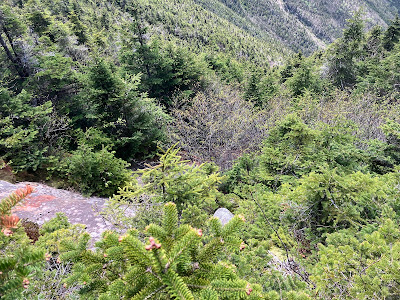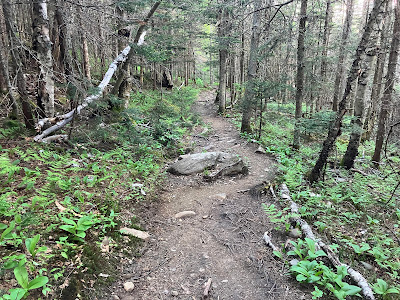With the luxury of the long daylight hours of late spring, I made a leisurely long loop over Mount Moosilauke, making a six-mile ascent via the Asquam Ridge Trail (Ridge Trail for short) and Beaver Brook Trail with a bushwhack to an old slide along the way. I descended via the Carriage Road/Snapper Trail/Gorge Brook Trail route, paying a visit to the South Peak for additional views. In addition to the great views at the summit, I had looks into four of the ravines on Moosilauke - three from the trails and one from an off-trail vantage.
A Dartmouth Outing Club sign points the way beyond the end of the Ravine Lodge Road.
A classic DOC bridge over the Baker River.
Pleasant, easy-graded walking as the Ridge Trail heads deeper into the upper Baker River valley.
An artifact at Camp 3, used by the Parker-Young Company while logging in the upper Baker River basin in the 1940s.
The Ridge Trail makes a long gradual ascent along the flank of the Moosilauke spur known as the Blue Ridge. Unfortunately the trail has become rockier and more eroded in recent years, more from torrential rainstorms than hiker use, as this route is lightly traveled.
The Ridge Trail passes through miles of beautiful upland conifer forest.
It gains the ridgecrest by a series of switchbacks leading up to Mount Jim through deep high country forest.
Mount Jim (4172 ft.) does not have enough prominence to make the AMC 4000-footer list, but it is on the Trailwrights 72 list. The elevation gain from the Ravine Lodge trailhead is only 1700 ft., spread out over 3.9 miles. The summit is quiet, wooded and viewless.
As the trail descends off Mount Jim, there is a view ahead to Mount Blue (4529 ft., another Trailwrights 72 peak) from an open fir wave.
The Ridge Trail ends at the junction with the Beaver Brook Trail/Appalachian Trail. From here there is still 1.9 miles to go to reach the summit of Moosilauke.
After an easy section and a short climb, the Beaver Brook Trail traverses a rough and rocky stretch along the steep face of Mount Blue, at the edge of Jobildunk Ravine.
A small vantage beside the trail, with a dropoff close beside it (use caution!), offers a view SE over the ravine to distant horizons.
There are beaver ponds on the flat floor of Moosilauke's finest example of a glacial cirque.
A tricky ledge scramble near the end of the traverse above the ravine.
After a rocky climb, there is a gentle walk through boreal forest along the west side of Mount Blue.
After another 3/4 mile, near the junction with the Benton Trail, I made a fairly short but also fairly intense bushwhack to the top of an old overgrown slide on the headwall of Tunnel Ravine, the wild glacial cirque on the NW side of Moosilauke. I marveled at the view when I first visited this spot four years earlier, and felt it was worth a repeat visit.
Evidence suggests that this slide fell during a rainstorm in June 1973. It is now completely revegetated except for a steep ledge slab at its top.
Looking down the overgrown track of the slide.
A great view of the big 2011 Irene slide across the ravine. The light green swath, partly in shadow, to the left of the Irene slide is probably the fully revegetated track of a massive slide that fell in the 1870s. In the late 1800s guests staying at the Tip Top House on the summit of Moosilauke could follow a footpath to the top of the slide, which was apparently quite an impressive sight.
A closer look at the Irene slide, impressive in its own right. There have been many other slides in Tunnel Ravine over the years, including in 1927, 1938, the late 1960s, and the mid-1980s. A 1927 slide served as part of the route of the DOC Tunnel Ravine Trail, opened in 1930 and abandoned by the late 1940s.
Long view to the west beyond Mount Clough and the Benton Range.
Looking across the steep headwall of Tunnel Ravine.
An important message as the Beaver Brook Trail approaches treeline.
Climbing to the sky.














































No comments:
Post a Comment